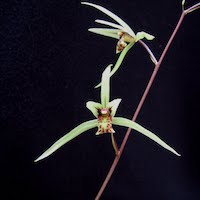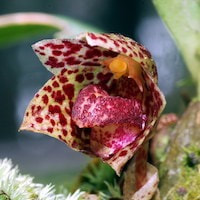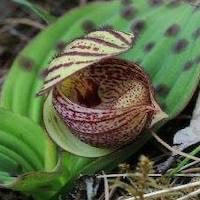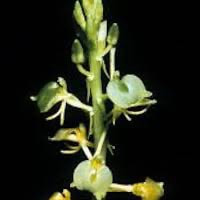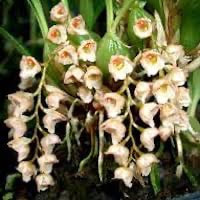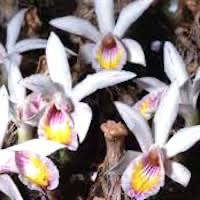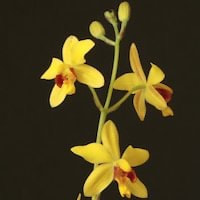A Symphony of Citrus and Orchid Notes
The essential oil blend combines a captivating array of scented notes. The fragrance begins with heavy citrus notes, featuring the refreshing and invigorating aromas of Mandarin and Bergamot. The addition of Balsam and Anise adds depth and complexity, providing a warm and spicy undertone to the blend. These scented notes intertwine harmoniously to create a captivating fragrance that is both uplifting and comforting.
Encyclia Citrina is a stunning orchid species with an upright, monopodial growth habit and mottled leaves. It is native to Luzon and Mindanao in the Philippines, where it thrives at elevations of 800 to 1200 meters. During the flowering period from February to May, it produces beautiful pink blooms with a delicate fragrance. This orchid, though not native to Singapore, has been included in our fragrance portfolio due to its enchanting citrus scent.
Bulbophyllum griffithi, also known as Stone Bean Orchid, is distributed in various regions, including central Taiwan, southeast Yunnan, Vietnam, northeast India, Bhutan, and Nepal. It blooms in February, August, and October to November in China, and in August in the Khasia Hills and Sikkim. This orchid species has therapeutic applications, particularly for addressing chronic coughs, bronchitis, and sore throat. Its fresh or dry pseudobulbs are used to relieve coughs, reduce inflammation, and alleviate pain. Additionally, a paste made from the plant is applied to fractures, infected breasts, abscesses, and various types of sores.
Cypripedium margaritaceum, also known as Banyeshao Lan, is a unique orchid species found in deep shade, with its leaves horizontally spread across the forest floor. It is used in herbal medicine to nourish the liver and kidneys, regulate vital energy (qi) and blood, promote diuresis, relieve edema, and improve vision-related issues. A decoction prepared from 9 to 15 grams of the herb is commonly used.
Liparis tschangii, known as Tibetan Sheep Ear Garlic, is distributed in Tibet, southwest Sichuan, Yunnan, Laos, Thailand, and Vietnam. In Chinese herbal medicine, the stems of this orchid species are used to improve blood flow and stop bleeding, particularly persistent vaginal bleeding.
Pholidota yunnanensis is a terrestrial orchid with a creeping rhizome, found in various regions including southeast Yunnan, southwest Guizhou, Guangxi, Hubei, Hunan, and Vietnam. It contains several stilbenes, such as phoyunbenes A, B, C, D, and E, which possess antioxidant properties. The plant is used in herbal medicine to treat ordinary coughs and asthma. In traditional Chinese medicine, a tincture of Pholidota, consumed with rice, is recommended as a tonic for internal injuries.
These orchid species, with their distinct scents and therapeutic properties, contribute to the unique and captivating fragrance blend. Each note adds its own character and allure, resulting in a harmonious composition that embodies the beauty and benefits of these remarkable orchids.
Encyclia Citrina is a stunning orchid species with an upright, monopodial growth habit and mottled leaves. It is native to Luzon and Mindanao in the Philippines, where it thrives at elevations of 800 to 1200 meters. During the flowering period from February to May, it produces beautiful pink blooms with a delicate fragrance. This orchid, though not native to Singapore, has been included in our fragrance portfolio due to its enchanting citrus scent.
Bulbophyllum griffithi, also known as Stone Bean Orchid, is distributed in various regions, including central Taiwan, southeast Yunnan, Vietnam, northeast India, Bhutan, and Nepal. It blooms in February, August, and October to November in China, and in August in the Khasia Hills and Sikkim. This orchid species has therapeutic applications, particularly for addressing chronic coughs, bronchitis, and sore throat. Its fresh or dry pseudobulbs are used to relieve coughs, reduce inflammation, and alleviate pain. Additionally, a paste made from the plant is applied to fractures, infected breasts, abscesses, and various types of sores.
Cypripedium margaritaceum, also known as Banyeshao Lan, is a unique orchid species found in deep shade, with its leaves horizontally spread across the forest floor. It is used in herbal medicine to nourish the liver and kidneys, regulate vital energy (qi) and blood, promote diuresis, relieve edema, and improve vision-related issues. A decoction prepared from 9 to 15 grams of the herb is commonly used.
Liparis tschangii, known as Tibetan Sheep Ear Garlic, is distributed in Tibet, southwest Sichuan, Yunnan, Laos, Thailand, and Vietnam. In Chinese herbal medicine, the stems of this orchid species are used to improve blood flow and stop bleeding, particularly persistent vaginal bleeding.
Pholidota yunnanensis is a terrestrial orchid with a creeping rhizome, found in various regions including southeast Yunnan, southwest Guizhou, Guangxi, Hubei, Hunan, and Vietnam. It contains several stilbenes, such as phoyunbenes A, B, C, D, and E, which possess antioxidant properties. The plant is used in herbal medicine to treat ordinary coughs and asthma. In traditional Chinese medicine, a tincture of Pholidota, consumed with rice, is recommended as a tonic for internal injuries.
These orchid species, with their distinct scents and therapeutic properties, contribute to the unique and captivating fragrance blend. Each note adds its own character and allure, resulting in a harmonious composition that embodies the beauty and benefits of these remarkable orchids.
Download the guided mediation that works best with this Orchid fragrance oil
| men_citrus_essential_oil_orchi_00005.mp3 | |
| File Size: | 184820 kb |
| File Type: | mp3 |
The Beauty and Benefits of Orchid Fragrances
Contains Scented Notes of following in various proportions:
Native Singaporean Orchid notes: Cymbidium Kanran
|
Cymbidium Kanran - Used in Citrus 5 (Men) for Team building Perfume workshop
Cymbidiums, belonging to the orchid family, are renowned for their luxurious beauty. These exquisite flowers feature large blooms with pointed edged petals and a distinctive patterned lip. The Cold Growing Cymbidium is native to Indochina, Singapore, China, Taiwan, Japan, and the Ryukyu Islands. In addition to their captivating appearance, Cold Growing Cymbidiums possess a delightful scent. The fragrance is light, citrusy, sweet, and carries a subtle musky undertone. The scent gradually develops and intensifies after the flowers open, adding to the allure of this orchid. Chinese herbalists recognize the medicinal properties of the entire Cymbidium plant. It is used to purify the heart and smooth the lungs, offering relief from coughs and asthma. The roots of the plant are utilized in the treatment of gastroenteritis and ascariasis, which is the infestation of large intestinal roundworms. This highlights the multifaceted nature of the Cold Growing Cymbidium, as it not only delights the senses but also offers potential health benefits. Overall, the Cold Growing Cymbidium enchants with its opulent blooms, delicate fragrance, and traditional medicinal applications. Its presence in the fragrance blend adds a touch of elegance and sophistication, contributing to a truly captivating olfactory experience. |
Therapeutic Orchid notes:
|
Bulbophyllum griffithi Syn. Bulbophyllum calodictyon Schltr., B. chitoense S.S. Ying, Sarcopodium griffithi Lindl
Chinese name: Duanchishiduo Lan (stone bean orchid), Xiaolushidaolan (small green stone bean orchid) Chinese medicinal name: Shichuanlian This particular orchid species is found in various regions, including central Taiwan, southeast Yunnan, Vietnam, northeast India, Bhutan, and Nepal. Its flowering period varies, occurring in February, August, and October to November in China, and in August in the Khasia Hills and Sikkim regions of northeast India. The main application of this orchid in traditional medicine is for the treatment of chronic coughs, bronchitis, and sore throat. Both fresh and dry pseudobulbs are utilized to address pulmonary conditions, providing relief from coughs, alleviating pain, and reducing inflammation. Additionally, a paste made from this orchid can be applied topically to fractures, infected breasts, abscesses, and various types of sores. The therapeutic properties of this orchid species make it a valuable ingredient in medicinal practices, particularly for respiratory ailments and conditions affecting the throat and lungs. Its inclusion in the fragrance blend adds not only a unique scent profile but also carries the essence of its healing properties, creating a harmonious combination of aromatic and therapeutic qualities. |
|
Cypripedium margaritaceum Franch.
Chinese names: Banyeshao Lan; Chinese medicinal name: Lanhuashuangyecao This orchid species thrives in environments with deep shade, and its leaves are positioned horizontally across the forest floor. In herbal medicine, it is highly regarded for its nourishing effects on the liver and kidneys. It is believed to have a balancing effect on the body's vital energy, known as qi, as well as on the circulation of blood. The herb is valued for its diuretic properties, promoting the elimination of excess fluid and reducing edema. It is also known to improve vision-related issues such as blurred vision or night blindness. Particularly in the Yunnan region, this orchid is widely used as a folk herb. To harness its therapeutic benefits, a decoction is typically prepared by boiling 9 to 15 grams of the herb. This method allows the active compounds within the orchid to be extracted and infused into the liquid, creating a medicinal drink that can be consumed to support liver and kidney health, promote diuresis, and address vision problems. The inclusion of this orchid in the fragrance blend not only adds a unique scent note but also symbolizes its traditional use in promoting overall well-being and vitality. |
|
Liparis tschangii Schltr.
Chinese name: Xizang Yangersuan (Tibetan sheep ear garlic), Zhebao Yangersuan This orchid species is naturally found in various regions, including Tibet, southwest Sichuan, Yunnan, Laos, Thailand, and Vietnam, thriving at elevations ranging from 1100 to 1700 meters. In traditional Chinese herbal medicine, the stems of this orchid are highly valued for their medicinal properties. They are specifically used to enhance blood circulation and address issues related to bleeding, particularly persistent vaginal bleeding. The herb is commonly obtained from Tibet and Yunnan, where it has been traditionally harvested and utilized for its therapeutic benefits. The stems are carefully processed and incorporated into herbal remedies to help improve blood flow and promote clotting, thereby effectively addressing issues of excessive or prolonged vaginal bleeding. The inclusion of this orchid in the fragrance blend not only contributes to its unique scent but also symbolizes its traditional usage in Chinese herbal medicine to support blood circulation and alleviate bleeding-related concerns, particularly in the context of persistent vaginal bleeding. |
|
Pholidota yunnanensis Rolfe
Chinese medicinal name: Shizaozi This particular orchid species exhibits a creeping rhizome and thrives in sparse woods, specifically on karst formations and tree trunks. Its natural habitat encompasses regions such as southeast Yunnan, southwest Guizhou, Guangxi, Hubei, Hunan in China, as well as parts of Vietnam. It typically grows at elevations ranging from 1200 to 1700 meters. In terms of its phytochemistry, various compounds have been identified in this orchid, including four stilbenes: phoyunbene A, B, C, and D, along with a bis(dihydrophenanthrene ether) known as phoyunbene E. These compounds possess antioxidant properties and have been found to inhibit the production of nitric oxide in certain cells. Additionally, some of the compounds have shown DPPH free radical-scavenging activity. One specific compound, phoyunbene B, has demonstrated potential in inhibiting cell division, inducing programmed cell death (apoptosis), and inhibiting the invasion of liver cancer cells. These properties hold promise for potential clinical efficacy in the future. In traditional herbal usage, the entire plant is utilized by cooking it in pork porridge, which is then consumed to address ordinary coughs and asthma. Traditional Chinese Medicine (CTM) practitioners also recommend a tincture of the Pholidota, typically prepared in distilled rice spirit, as an alternative remedy. This tincture is consumed alongside rice as a tonic for internal injuries. The incorporation of this orchid in the fragrance blend not only adds to its distinctive scent but also highlights its traditional usage in herbal medicine. The various compounds present in the plant have shown antioxidant properties and may have potential health benefits. |
|
Pleione maculata (Lindl.) Lindl. & Paxton
Chinese name: Qiuhuadusuan Lan (autumn flowering single bulb orchid) Myanmar Name: Phar la tet thitkhwa phyu This orchid species is an epiphyte, meaning it grows on tree trunks, specifically in broad-leaved, evergreen forests. Its natural habitat includes regions such as western Yunnan in China, Bhutan, Sikkim, Arunachal Pradesh, and Assam in India, as well as Myanmar and northern Thailand. In terms of traditional herbal usage, the pseudobulbs of this orchid are employed in treating liver complaints and stomach ache in India and Nepal. The specific methods of preparation and administration may vary depending on the local traditions and practices. The inclusion of this orchid in the fragrance blend highlights its natural habitat and traditional medicinal uses. The pseudobulbs of the orchid add depth and complexity to the overall scent while also acknowledging the cultural significance and herbal properties associated with it. |
|
Spathoglottis pubescens Lindl.
Chinese names: Baoshe Lan (bud tongue orchid), Huanghuaxiaodusuan (yellow flower small single garlic), Chinese medicinal name: Huanghuadusuan (yel- low flower single garlic) Thai names: Toe si re kho (Karen and Mae Hong Son), Ban Chuan (Mae Hong Son), Ueang din (Lampang), Ueang din lao (in Chiang Mai), Ueang nuan chan (in the north) The Chinese herb in question originates from the region south of the Yangzi River. Interestingly, it was among the first plants to colonize the devastated landscape of Krakatoa following a massive volcanic eruption in 1883. Even today, the seeds readily germinate when scattered around the parent plant, showcasing its resilient nature. However, despite its ability to thrive in harsh conditions, this herb is highly susceptible to viral infections. As a result, it is commonly used as an indicator plant to identify the presence of viruses in other plants. In traditional herbal usage, the stem of this herb is believed to have beneficial effects on the lungs. It is known to alleviate coughs, promote tissue healing, and aid in the formation of new tissue (granulation). To prepare a decoction, approximately 9 grams of the herb is typically used. Additionally, the fresh herb is often employed in the creation of poultices, which can be applied externally to treat various ailments. This herb's unique characteristics, including its resilience and sensitivity to viruses, make it an intriguing component of the fragrance blend. The herb's healing properties and association with lung health add depth and significance to the overall scent, honoring its traditional uses and cultural importance. |
Other scent note
Scentopia Library Reference ingredient
Neroli - Check details at Scentopia's scent library
Join Scentopia's wonderful orchid scent crafting, fragrance tour, bridal shower or corporate team building which includes perfume making onsite and offsite, beach activities and more. We also serve primary school learning journey, secondary students and pupil on industrial excursions. Know more about our orchids perfume bar or therapeutic orchid scents and other wellness aromas. Conatct Perfume workshop or book a scent crafting session here.
